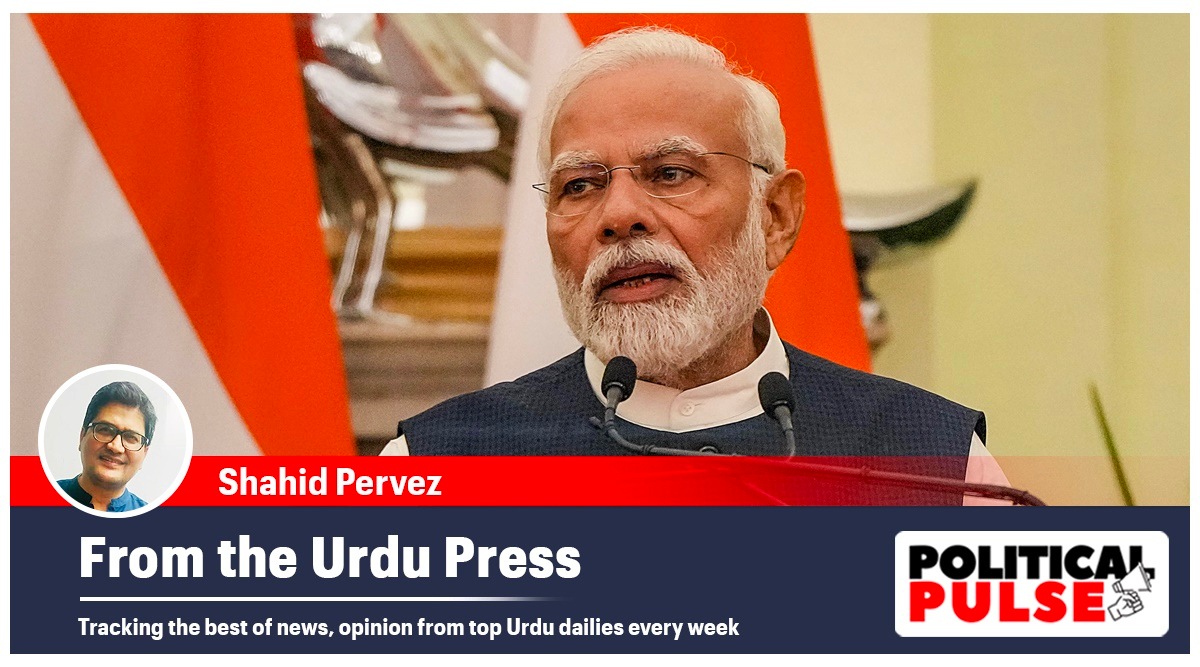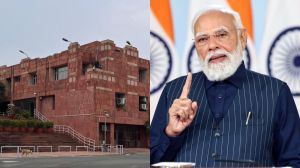With the Election Commission declaring the schedule for the Assembly polls in five states, the Urdu press has sharpened its focus on what are being seen as semi-finals before the Lok Sabha elections. Bihar’s caste survey also finds a prominent place, having set off a churn in national politics, with the Congress and other Opposition parties seizing on the issue as their key plank to counter the BJP.
Another major story dominating their headlines is the Middle East crisis, with the dailies calling for a resolution of the Israel-Palestine conflict, that has been festering for decades, by recognising the “existence, rights and dignity” of the Palestinians on their lands.

INQUILAB
Highlighting the Nitish Kumar-led Bihar government’s move to declare its caste survey results, the New Delhi edition of Inquilab, in its leader on October 5, writes that its significance and implications would not remain confined to just Bihar. “Bihar’s caste survey is going to have national repercussions with demands set to grow from various states for a similar exercise, who would come under increasing pressure to follow suit,” it says, citing the instances of states like Maharashtra, Odisha and Jharkhand, which are ruled by different parties or coalitions.
The editorial says that the BJP finds itself in a spot over the Bihar development since, despite not accepting the demand for a caste census, it could not afford to oppose it either. “This is why Prime Minister Narendra Modi has raised a question over it in a different way,” the edit says. It refers to PM Modi’s bid to take on the Congress for demanding a nationwide caste census, asking its leadership whether they wanted to take away the rights of the minorities by pushing for “jitni abaadi utna haq” (rights in proportion to population). “Why was the minority rights issue raised by the BJP dispensation is unclear since such rights would also entail representation in government — and the BJP neither gives tickets to Muslim candidates in the Assembly and Lok Sabha elections nor inducts minority faces into its governments. Is it because the caste survey affair has put the saffron party under pressure now?”
With the election season heating up, the BJP would mount attempts to change this political narrative, the daily says. On the other hand, the Opposition bloc would stick to its guns, the edit says, adding that “It is difficult to predict whose strategy would eventually prevail. But one thing is clearer: earlier the BJP used to set the narrative pushing the Opposition to the back foot, now the latter seems to have turned the tables.”
In Bihar, the development seems to have boosted the prospects of the ruling Mahagathbandhan, which includes the JD(U), RJD, Congress and Left parties, the editorial states. The BJP-led NDA had swept the state in the 2019 Lok Sabha polls, winning 39 of the total 40 seats.
Inquilab also writes that a relatively lesser number of upper-caste candidates would be given election tickets by the parties now. “In Bihar, the Muslim-Yadav’s combined 32 per cent population share would mean that they would not have to struggle for their rights,” it says. The caste survey would also push the demand for raising the 50 per cent ceiling on reservation, it adds.
Story continues below this ad
URDU TIMES
Commenting on the raging Israel-Hamas war, the Mumbai-based Urdu Times, in its editorial on October 9, charges that the “hypocrisy” of the world and media over the conflict between Israelis and Palestinians remains glaring.
It notes that Hamas, which has been ruling Gaza Strip since 2007, has said that its militants have launched the “Operation Al-Aqsa Storm” as a response to atrocities against Palestinians and their holy sites, such as the Al Aqsa mosque, by Israel, which has maintained its occupation of the Palestinian territories for decades.
The editorial says that while Hamas is being condemned for attacking Israel, the global media “turns a blind eye to the Israeli offensive against Palestinians including children”. Israel’s leading newspaper Haaretz has held Israel Prime Minister Benjamin Netanyahu responsible for the crisis, Urdu Times notes. The attack by Hamas, it says, has “exposed” the “failures” of the Israeli military and intelligence, even though spying tools like Pegasus are sold by Israelis to other countries.
“Prime Minister Modi has declared support for Israel, which is a shift from India’s policy on the Israel-Palestine standoff. India has always remained non-partisan over the issue,” the daily says. It also refers to late Atal Bihari Vajpayee’s statement as the external affairs minister during the Janata Party government that Israel must vacate the Palestinian land for peace in Middle East. It says New Delhi had close ties with Palestinian leader Yasser Arafat.
Story continues below this ad
The edit also says that the Israel-Palestine face-off is a “conflict between two states and not between two religions”.
SIASAT
Referring to the crackdown by the Delhi Police Special Cell on the news portal NewsClick and the arrest of its founder and editor-in-chief Prabir Purkayastha and a staffer under various sections of the anti-terror UAPA and IPC, the Hyderabad-based Siasat, in its editorial on October 5, underlines that the police also raided multiple locations and questioned a slew of journalists, employees and contributors associated with the news portal.
The daily writes that such a clampdown on NewsClick and journalists is in line with charges made by various quarters about the alleged politics of vendetta being practised by the government against its opponents and critics. This has been seen in cases of many Opposition leaders and social activists, who have been targeted by central agencies like the CBI and ED in multiple cases, it says.
“Several journalists had also been victimised earlier, who were just trying to highlight the government’s failings,” the daily says. Kerala journalist Siddique Kappan was incarcerated for nearly two years under the UAPA for trying to report on the rape-murder of a Dalit girl in UP’s Hathras, it notes, adding that a local journalist was booked for reporting on roti-salt being allegedly served under the mid-day meal scheme in a UP school. “On the other hand are pro-dispensation TV anchors who have been spreading hate and creating social discord with impunity. They have the licence to defame anyone, hold media trials and label anyone as anti-national. They have never faced any action even though various courts have routinely taken them to task. It shows that the government is only interested in going after its detractors.”
Story continues below this ad
The edit points out that free speech is enshrined in our Constitution and that a journalist has the freedom to exercise it. An independent press is the fourth estate in any democratic country, it says. “As regards terrorism, there cannot be any compromise with it. So if there is any veracity in terror charges against any accused, then action must be taken against them whosoever they might be. But if these charges are being slapped for political reasons, then it is condemnable.”

































